|

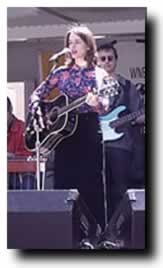 It's
midday in midtown Manhattan and I'm sneaking off for an extended lunch
from work to catch the CMJ Music Showcase and to talk with sing/songwriter
Laura Cantrell. It's
midday in midtown Manhattan and I'm sneaking off for an extended lunch
from work to catch the CMJ Music Showcase and to talk with sing/songwriter
Laura Cantrell.
Jeremy Tepper, owner of Diesel Only Records and Laura's husband greets
me at the revolving door of the Hilton. I tell him I can't stay after
the show and he says, Laura's gotta jet back to work too.
Already I like her. But I'm biased. I've had a week to listen to her wonderful
album, Not the Tremblin Kind. About to meet her, I'm trembling. By day
(excluding lunch this day) Laura works in the equity research department
of Bank of America, by night (she did a show just the night before), she's
the country sweetheart whose won over the likes of Rolling Stone and indie
champ John Peel. During the week she keep track of the records, on the
weekends she spins them as the host of freeform radio WFMU's Radio Thrift
Shop, a gig she's had since 1993.
Its difficult doing a day job and gigs, she tells me after a warm hello,
but it helps as far as getting a record out. It takes money to make a
record. Its only minutes before she goes on, but Laura, a Nashville native
who came to New York to study at Columbia and stayed, talks to me about
the current difficulties of being a graduate when she finds out I am one.
"I feel sorry for these kids," she catches herself, ...These
kids! "I sound like an old woman. There's no opportunity for them
to just pick up and move out to New York." Her concern shows her
good nature, one shared by Jeremy who even introduced me to his mother
at the show (complete with camcorder and beaming smile).
When I tell him I'm not exactly sure what I'll do with the interview,
but that I can do it, he says, "Well, then do it," and sets
up a date for me and Laura. Laura takes the stage in a vintage red lace
top and black skirt and boots, and with a stunningly bare voice, sways
the room.
A week later I get a glimpse into her less glamorous life. She arrives
a bit late to the cafe at the Virgin Mega Store, Union Square. She meets
me straight from work and its well after 7:30. Though, its a real hectic
time of year at the office, you wouldn't guess it from looking at her.
In sharp glasses and a suit, she sips her tea with the surety of a seasoned
veteran - to the bank, the music world, and interviews. What am I supposed
to ask someone who's received rave reviews from just about every New York
publication not to mention those in Scotland, where she also has a strong
following? I decide to open with something original.
ER: Did you always want to be a singer? Was it always in you?
LAURA: I always wanted to do something musical but I had all these doubts.
That was a self-confidence issue, so I probably played down certain things
because you never know when they're gonna blowup.
ER: You've said you're not driven. Then how did you get to where you are
now?
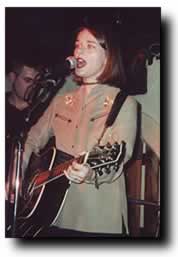 LAURA:
When I think of somebody driven, I guess I sort of more mean someone obsessed
with the idea of becoming a certain type of artist. I've definitely worked
hard to get my music heard by anybody who'll listen. And over the years
I've also put a lot of effort into making a transition from being on a
radio show that's about this music to actually making this music. I've
never really had the idea that there would be success, its not like I
didn't fantasize about having a hit record, but when I think of somebody
driven I think of Shelby Lynn. You know, people whove got this absolute
undeniably strong quality about them. Or like Ryan Adams, this certain
charisma - undeniable. I don't think of myself that way. LAURA:
When I think of somebody driven, I guess I sort of more mean someone obsessed
with the idea of becoming a certain type of artist. I've definitely worked
hard to get my music heard by anybody who'll listen. And over the years
I've also put a lot of effort into making a transition from being on a
radio show that's about this music to actually making this music. I've
never really had the idea that there would be success, its not like I
didn't fantasize about having a hit record, but when I think of somebody
driven I think of Shelby Lynn. You know, people whove got this absolute
undeniably strong quality about them. Or like Ryan Adams, this certain
charisma - undeniable. I don't think of myself that way.
ER: How did you make that transition from playing to making music?
LAURA: I've sort of been performing all along. I've had different little
bands, not necessarily country. I was playing in college and doing a country
radio show. I think one of the things that helped me to have confidence
was seeing what the local musicians and what the local audience said about
my radio show, how well received it was. People who I knew were great
players were like, Oh, I heard you play this on the radio. It was great.
It gave me a way to talk to them, to become a peer of theirs before I
was really ready to do that with my music.
ER: It seems like everything just fell into place.
LAURA: Well, its not that. I think that there are a lot of musicians who
aren't shooting to be platinum artists, who have modest goals. They want
to make their own music in a format that people can digest it in. And
I think that I saw that especially in the early 90s, there was a lot of
country music stuff coming out that wasn't purely country. It had other
roots. Or stuff that wasn't exactly country but had a country influence.
I took inspiration from those things and these artists to think, maybe
we can use something like this and not have to say I'm gonna quit my job
now. So I guess that process for me is kind of realizing what you can
do as an independent artist right now.
ER: Do you think because you grew up in Nashville surrounded by some many
people trying to make it, you were more levelheaded about your aims?
LAURA: You definitely get an overdose of musicians in Nashville these
days. You know, its like this Mecca.
ER: Like an actor in LA?
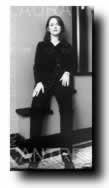 LAURA:
Or New York. They come and think I'm gonna get on one of these five record
labels and have my shot. But that never really was what I was interested
in. LAURA:
Or New York. They come and think I'm gonna get on one of these five record
labels and have my shot. But that never really was what I was interested
in.
I'd feel sometimes if I had a different voice, that was what I wanted
to do. But I was inspired by lot of the older artists. I almost feel like
the history of the music was what I most inspired by, more than the idea
that I could make a video.
ER:If you had a different voice?
LAURA: I think again of someone like Shelby Lynn or people out there who
just have these voices that are almost larger than life. For those people
they should try to be more out there, you know to shoot for Patsy Cline's
crown. You might as well. My voice doesn't really go there.
ER: But isn't that the charm of it? Isn't that what people love about
it?
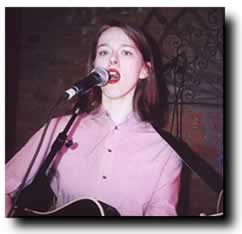 LAURA:
I think that people can relate to it. There are a lot of artists whose
songs I appreciate and I don't really think they have amazing voices.
But they can convey their message, they can communicate through their
singing. Then there's the people like Buddy and Julie Miller, who are
really great singers. I don't think either of them has a show-stopping
voice but they really put a lot of different emotion into their singing.
And I'm not comparing myself to them, but I really think that if I could
emulate someone it would be them, that they are able to have so much meaning
in their singing. That's really something that people will bond to. LAURA:
I think that people can relate to it. There are a lot of artists whose
songs I appreciate and I don't really think they have amazing voices.
But they can convey their message, they can communicate through their
singing. Then there's the people like Buddy and Julie Miller, who are
really great singers. I don't think either of them has a show-stopping
voice but they really put a lot of different emotion into their singing.
And I'm not comparing myself to them, but I really think that if I could
emulate someone it would be them, that they are able to have so much meaning
in their singing. That's really something that people will bond to.
ER: What made you come to New York?
LAURA: It was really exciting and Columbia was the best school I got into.
I got into Vanderbilt too, which is in Nashville, so I was weighing. I
could go to New York City and to an ivy league school, or I could stay
in Nashville and go to Vanderbilt. And there's nothing wrong with that,
most of my family went to Vanderbilt, but it just seemed like it would
be totally the same.
ER: What you knew versus what you didn't
LAURA: Right.
ER: I wasn't surprised to learn that you were an English major. There's
definite a literary quality to your songs. What writers influenced you?
LAURA: I was heavily into several Southern writers when I was in college.
A lot of kids from the South who identify themselves as Southern, when
they leave they have a moment when they go, What was this whole culture
that I left behind. Its kind of alien, its not the same as New York or
wherever, and you try to come to grips with that and look for writers
who have had that experience. Definitely Robert Penn Warren and Katherine
Porter. I'm not saying I cultivated a great knowledge of them but this
is the stuff that I gravitated towards.
ER: Did you want to be a writer?
LAURA: Well, I think there definitely is an urge to write, to be more
than a songwriter or in songs to be able to tell stories. I don't feel
that I do it very well.
ER: That you write songs very well or that you tell stories very well?
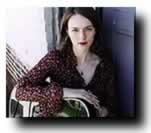 LAURA:
I don't think that getting those to fit into a song format is necessarily
a strength for me. I think of people who do it really beautifully like
Steve Earle or Lucinda Williams, who are able to write these amazing details
that just open up whole worlds. They're very visual. I think I'm trying
to take my own little skills and use them in the same way. LAURA:
I don't think that getting those to fit into a song format is necessarily
a strength for me. I think of people who do it really beautifully like
Steve Earle or Lucinda Williams, who are able to write these amazing details
that just open up whole worlds. They're very visual. I think I'm trying
to take my own little skills and use them in the same way.
ER: You were worried about your songs not blending with the other songs
on your album. Were there songs you left out?
LAURA: There were definitely some songs that I was working on that either
weren't finished yet or were older and didn't seem to fit. I have a little
EP that I made about five years ago. We thought of re-recording some of
those songs but we decided not to. These pieces just seem to fit really
nicely. No perfectly. On Not the Tremblin Kind you ride with lovers, drinkers
and losers.
At times Laura conducts with lines like the title tracks opener: You can
play master but I wont wear your chain.
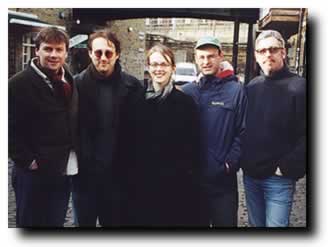 Other
times, as in Little Bit of You, a tune written by Jay Sherman-Godfrey
of the World Famous Jay Birds and who also plays guitar on the album,
she's as pleading as a caught stowaway. But her own songs are the standouts.
On Queen of the Coast she assumes with aching realism, the life of country
singer Bonnie Owens who does the washing, and ironing and pickin up while
she sings backup on her second ex-husband, Merle Haggard's tour. Churches
Off the Interstate is more hopeful. Though they cannot change the way
I feel inside, she sings, Ill dive right in and hope I turn out fine.
The momentum carries through on Big Wheel (co-written by Tepper and Godfrey)
whose train track rhythms made the Long Island Railroad I was riding on
when I first heard it, feel like a freight train. But the true treasure
of the album is Cantrell's My Heart Goes Out to You, where her voice and
Jon Graboffs mandolin flutter like two moths against your ribcage. Laura
Cantrell not only leads you through a landscape, she conjures her own-
part horizon line, part city skyline. Other
times, as in Little Bit of You, a tune written by Jay Sherman-Godfrey
of the World Famous Jay Birds and who also plays guitar on the album,
she's as pleading as a caught stowaway. But her own songs are the standouts.
On Queen of the Coast she assumes with aching realism, the life of country
singer Bonnie Owens who does the washing, and ironing and pickin up while
she sings backup on her second ex-husband, Merle Haggard's tour. Churches
Off the Interstate is more hopeful. Though they cannot change the way
I feel inside, she sings, Ill dive right in and hope I turn out fine.
The momentum carries through on Big Wheel (co-written by Tepper and Godfrey)
whose train track rhythms made the Long Island Railroad I was riding on
when I first heard it, feel like a freight train. But the true treasure
of the album is Cantrell's My Heart Goes Out to You, where her voice and
Jon Graboffs mandolin flutter like two moths against your ribcage. Laura
Cantrell not only leads you through a landscape, she conjures her own-
part horizon line, part city skyline.
But her modesty would probably find fault with that last paragraph. As
we wrap up, sharing books, bands and even some family anecdotes, a familiar
song comes over the sound system. It's Churches Off the Interstate. Laura's
obviously surprised. Maybe somebody recognized you, I say. She laughs,
shakes her head and glances down, hiding a bit of a blush. Well if they
didn't, they sure will soon.
for more information:
http://www.lauracantrell.com/
|
![]()
![]()